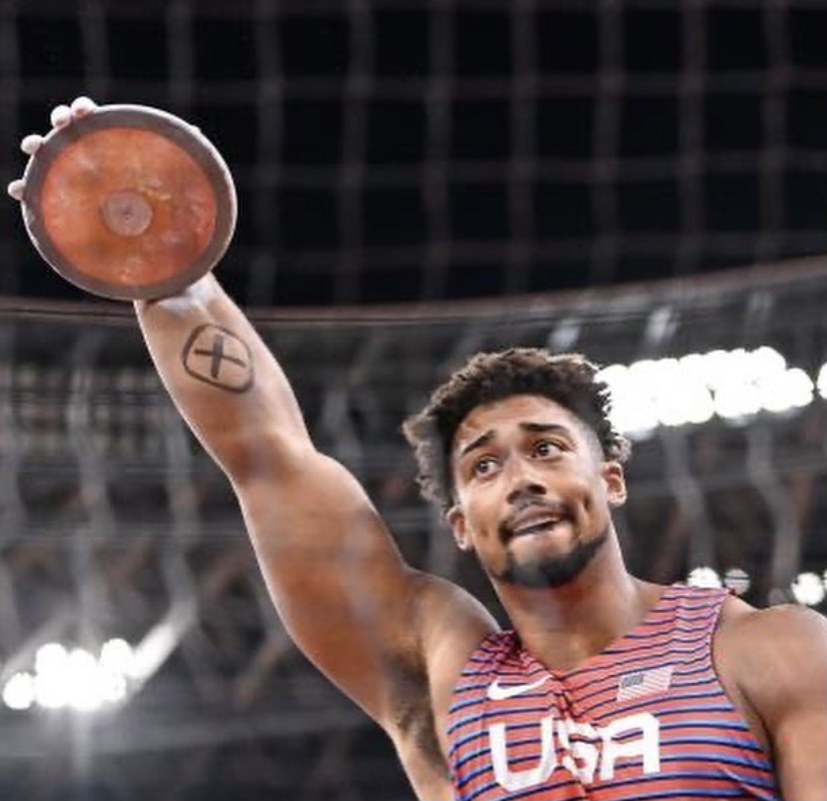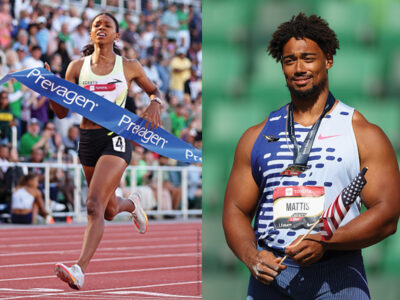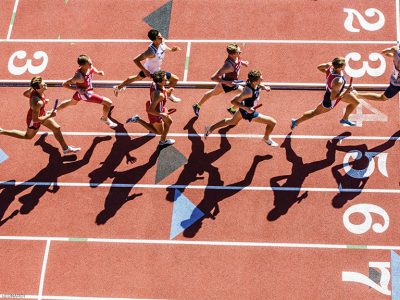
The star discus thrower reflects on his time at the Olympics—and why he’s already thinking about the next one.
After returning from Tokyo in early August, Sam Mattis W’16 gave himself “two days of traveling and unpacking and trying to get over jet lag.” Then it was right back to training. The next Olympics, after all, are just three years away and he hopes to win a medal in Paris.
“I think I can throw the disc a little bit further,” he says, “and I’m going to give myself three years to figure out how.”
Such is the determination of the former Penn track and field star, who made it to the finals of the men’s discus at this summer’s Olympics, finishing eighth overall with a season’s best throw of 63.88 meters (209 feet, 6.96 inches). Mattis led the largest contingent of Penn alumni and students at an Olympics in more than 30 years [“Quakers in Tokyo,” this issue] and got the chance to talk with fellow Team USA Olympian Regina Salmons C’18, a rower, while they were there.
But there wasn’t much else to do. Because of the pandemic—and the rising COVID cases in Japan during the Olympics—most of his days consisted almost entirely of sleeping, eating, training, and competing. “I flew 13 hours to Tokyo and I saw the Olympic Village and I saw the practice track and I saw the stadium,” he says. “We weren’t really allowed to do much. It’s a bummer but it makes sense.” He didn’t even do or watch much of anything on his phone so he could “focus on the moment.”
When the moment came, he certainly rose to meet it. Back in his hometown of East Brunswick, New Jersey, his mom and his dad Marlon—a former Jamaican hammer thrower who once described himself to the Gazette as a “rabid Olympic fan”—threw a morning party with other family members to watch him become the highest American discus finisher. Some Penn friends even “stumbled out of bed at 7 a.m.” at a bachelor party to watch him compete.
Not having family with him in Tokyo felt isolating for some athletes, with Mattis admitting a “post-Olympic dinner and maybe a party” might have been nice in non-pandemic times. But he was pleased to see more conversations spring up around mental health, led by superstar gymnast Simone Biles. “The stress of the Olympics by itself is a lot,” Mattis says. “And the Olympics during a pandemic where you can’t really do anything except sit in a room and think about the Olympics makes it extra tough.”
One thing Mattis did try to do was “use the 15 seconds we do have every four years to try to make a statement in support of social justice.” Coordinating with other USA track and field teammates, he chose a symbol to display for an Olympic audience, settling on an “X” inside a circle on his muscular right arm to form an intersection of injustices faced by oppressed people. “I wanted to pick something that didn’t necessarily have one meaning but could be broadly interpreted,” he says.
Mattis has been active in issues of social justice, attending Black Lives Matter rallies last summer, including the one in Philadelphia in which protesters were tear gassed by police on a highway, and in Berks County, where he lives and trains.
“I was just exhausted all the time, whether physically from the training or emotionally from everything going on,” says Mattis, who hopes to pursue a career in environmental justice after the 2024 Olympics. “But I felt like what I was doing was the right thing to do. At the end of the day, sports are nice and I love being an athlete. But there are bigger things going on and higher causes I can contribute to. If I can do that without running myself into the ground, that’s what I’ll do.” —DZ




